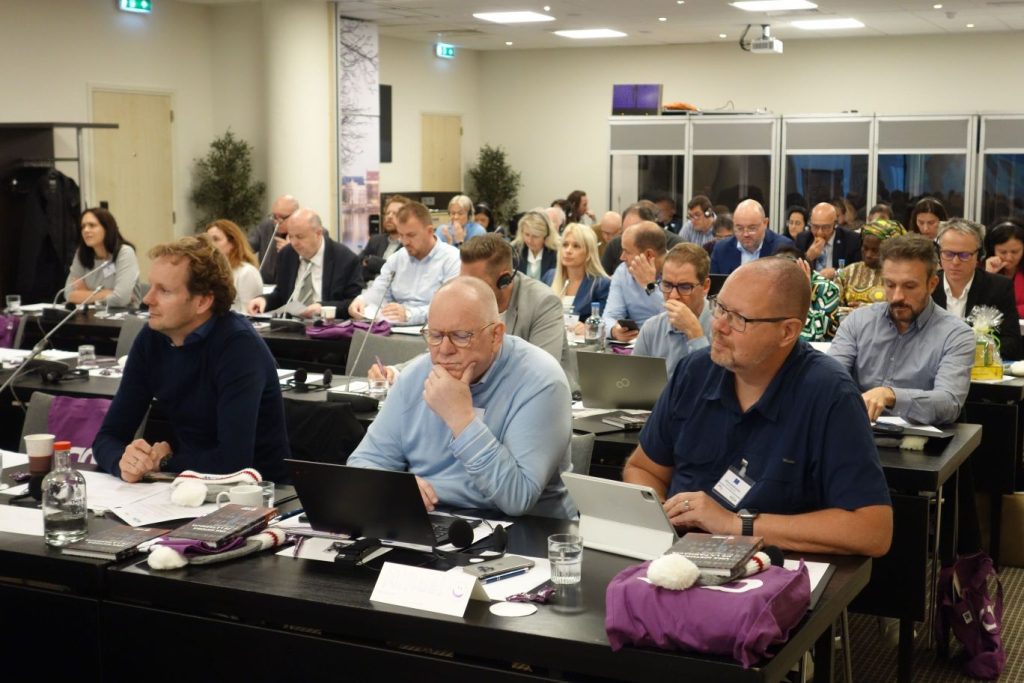The shortage of personnel is a tremendous challenge today. As a result of a combination of factors such as the COVID-19 pandemic, demographic changes, and an economy that is doing very well we see a labour-market that is struggling with finding sufficient staff.
Over 60 trade union leaders from the EU participated in a two-day seminar “The current pressure on the labour-market: How to solve the shortage of personnel?”. The seminar took place in The Hague, Netherlands. The initiative was organized by WOW-Europe in cooperation with the European Centre for Workers’ Questions (EZA) and funded by the European Union.
Professor Ulrich Walwei, Vice director of Germany’s Institute for Employment Research (IAB) of the German Federal Employment Agency (BA) stated that despite the fact that ‘the German Economy is in a crisis mode since 2020, the labour market is still robust’. Two major structural problems in the German labour market can be detected though. The persistent unemployment has become more visible and there is an increase in skill and labour shortages. Reasons for the difficulty to fill vacancies are: working conditions are not competitive (workers want something different than the labour market is offering), employers show unconvincing images, mismatch etc. Figures show that almost two thirds of all enterprises expect difficulties to recruit workers. So it will be more important than ever to include as many persons on the labour market and skilling the potential labour force by education, initial and further training.
In her 2023 State of the Union, the President of the European Commission, Ms. Ursula von der Leyen stated that ‘Instead of millions of people looking for jobs, millions of jobs are looking for people’. As labour and skills shortages are reaching record levels across all major economies, 74% of SMEs are saying they are facing skills shortages, Róbert Komáromi, Seconded National Expert, European Coordination Office (ECO) European Labour Authority (Slovakia) stated. The 2022 EURES report shows that there are a number of common shortage and surplus occupations in Europe. But these are not the same in each and every country making cross-border matching a solution to the shortages. The EURES dashboard facilitates in finding where shortages and surpluses can be found.
The Dutch labour market is, like the German one, extremely tight. The reasons for this, as described by Michel van Smoorenburg, International Labour Market Analyst, UWV Public Employment Services Netherlands, Department of Labour Market Information and Advice (Netherlands) are a high economic growth; low growth of labour productivity; higher sickness rate during and after covid; a high labour turnover; and a very flexible labour force (the Netherlands is number one in part time work). In order to tackle this skills shortage the UWV came with 34 solutions which can be divided into three categories: explore new talent; organize work differently; and bind and fascinate. ‘Through a variety of actions most employers are making efforts to cope with the shortages’ Van Smoorenburg stated. One such action is to use all Labour Market Slack. Additionally, one could look at making the work more attractive, using all the skills, and by increasing the income gap between benefits and wages, amongst others.
The labour-market situation in Voralberg, Austria is not much different than in many other Western European countries. The shortages can be found in the same sectors as we have seen in Germany and the Netherlands for example. What is different is that of the 403.000 inhabitants approximately 17.000 work in surrounding countries and region. Voralberg is located in the far west of Austria with borders to Switzerland, Germany, Liechtenstein and Tirol. In addition there is a high turnover. The reason for people to quit and change jobs is the desire for more flexibility and more possibilities for further education, Peter Stieger, Managing Director at Development-company labour-market Vorarlberg – FAV (Austria) declared. This change of perception of work is largely caused and/or speeded up by the COVID-19 pandemic. What the FAV does is focus on continuous education, because “Tomorrow’s professionals are not born. They are trained“.
Dennis Perrin, Provincial Director Alberta and Andrew Regnerus, Ontario Labour Relations Coordinator both of CLAC (Canada) demonstrated the current situation in the Canadian labour market. With a large number of members in Healthcare, Service Industries and Construction they encounter the exact same problems as we in Europe. Canada has an ageing population that demands more care. They further have an ageing workforce which is leaving the labour market. Both sectors experience a lack of interest to work in this field. So here too they are looking at improving education, incorporating and including everyone who is willing and able, and by looking abroad (Broadening the Tent). The approach has to be a personal one. One should cater the demands of the (new) labour force as much as possible. This is the new reality which employers have to accept.
Employers are increasingly struggling with the current labour-shortages. The Dutch Railroad is such an employer. Remco de Ruig, Project manager Learning Mobility & Recruitment National Railroad NS (Netherlands) stated that as a result of various factors (COVID-19, increased sick leaves and less passengers) the NS had to scale down on operations. ‘COVID-19 was, however, an instigator but not the cause of
labour market challenges’, De Ruig said. One temporary measure they took to tackle the shortages was to place office staff and temporary security staff on the trains. The action plan for the long term is to organize work differently and decrease the demand of labour through automation. They further try to show how attracting the work is by inviting potential train drivers on board of a simulator. And by asking retired staff to work on a parttime basis. ‘What was learned is that we should never lean back: fix the roof when the sun shines. And that the candidate is king (not the employer)’, De Ruig concluded.
Goce Trajkovski, General and International Secretary and Valon Ajdini, Member, of the Trade Union of Finances of North Macedonia (SFDM) gave a general analysis of the labour market movements and issues related to the shortage of labour power. By focusing on the reasons for global shortages and demonstrating ways to tackle these. Skills development and training programs, better job matching (education must be in line with the market needs), and improving working conditions in certain jobs were central to the solutions. Work should become more attractive and in line with the current demands and expectations, they said.
The seminar concluded with an international roundtable debate. Panellists from Spain, Bosnia and Herzegovina, Denmark and Spain discussed their challenges and solutions in their respective unions and branches.
What the two days in The Hague showed was that the challenge of finding personnel will haunt the labour market for some more years. There does not seem to be an easy way out. By being inventive and creative it should be possible to give answers to these troublesome challenges.
for pictures click here





